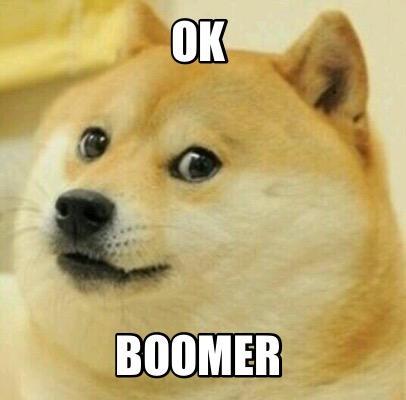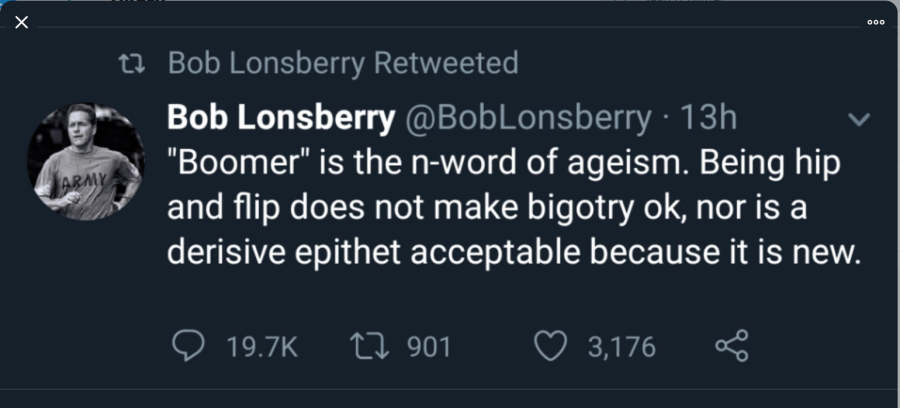
Ok boomer and the 'generation war'
By now, everyone has heard of it. The expression 'ok boomer' recently went viral all over the world. The term 'boomer' is short for 'Baby Boomer', a term first introduced as a name for the generation of people born between 1946 and 1964. During that period, the first decades after World War II, there was a dramatic increase, a ‘boom’ in number of births. But right now, the term is used to refer to people seen as charcterized by a common set of dominant values and concerns. 'Boomer' has become a nickname for someone who is old, very conservative and narrow-minded. The trend actually started in 2015 on 4Chan and in 2017 on Reddit, but after trending on Twitter in 2018, the term started to have a viral life of its own.
This new-found virality resulted in memes, discussion and mostly frustration between boomers, millennials and generation Z. The ongoing conflict or 'war' between these generations has thus been rekindled. Older generations are calling the catchphrase ‘ageist’, and are comparing it to racial slurs. Calling someone a boomer or saying ‘ok boomer’ is forbidden or even punishable in some workplaces. Boomers also started to introduce the term ‘zoomer’ as a comeback to ‘ok boomer’. What do these changes in discourse bring to both on- and offline linguistic landscapes?
The origins of ok boomer
So, where did this phrase come from? According to website Know Your Meme: 'The exact origin of the phrase is currently unknown. On 4chan, the retort was first used by an anonymous /r9k/ user on September 3rd, 2015 [Figure 1]. On Reddit, the phrase was first used as a retort on October 26th, 2017. On Twitter, the phrase was first used on April 12th, 2018.'
'The phrase and the whole concept of a generation war, did not see such a peak in 2018, but since January 2019 it has spread significantly. On January 14th, 2019, a Meme-creator user created an Ironic Doge meme captioned with the phrase, referencing the influential Ok Retard Doge image [Figure 2]. It's currently unconfirmed whether this upload is the first instance of the image.'
Then, in early November 2019, the phrase 'ok boomer' started spreading more widely thanks to an unidentified man on a TikTok video, who can be categorized as a Baby Boomer age-wise (born 1946 to 1964). He was filmed stating that 'millennials and generation Z have the Peter Pan syndrome' and 'they don’t ever want to grow up'.
The man says that millenials and generation Z'ers are mistaken in thinking that the 'utopian ideals' they knew in their childhood will be sustainable in adulthood as well. 'This video inspired the phrase 'ok boomer', as retaliation and dismissal of the ideals of past generations that have shaped politics, economics and the environment strongly'.
According to Vogue Australia, since November 14, the hashtag #OKBoomer has been used more than 732 million times, while more than 2,000 official hoodies have been sold for $34.99 apiece, emblazoned with the slogan: 'OK Boomer, have a terrible day'.
The ok boomer trend
After the rise of ‘ok boomer’ on 4Chan, Reddit, Twitter and TikTok, the term was quickly used in all sorts of social media posts and memes. It is used to shut people up, and today it doesn’t even really matter whether they actually are boomers generationally or not. Millennials and Generation Z people use it to reply to cringey tweets, posts and pictures. Some Generation Z’ers have turned this into a business. For instance, Shannon O’Connor designed merch with the text ‘ok boomer’, and after some TikTok promotion, she received orders for more than $10.000 worth of merch in total. New Zealand politician Chloe Swarbirck used the term in a debate after getting heckled by an older politician; that video also went viral.

Chloe Swarbrick says 'ok boomer' to someone heckling her during her speech
‘Ok boomer’ has also been the subject of a cornucopia of memes so far. A common structure for these memes is that of presenting someone saying something that is considered stupid, close-minded or conservative by younger generations, and following that with a reaction picture that says ‘ok boomer’. Another kind of meme presents someone elderly-looking saying basically anything, boomer-ish or not, and another person saying ‘ok boomer’. An example of this is a meme featuring Darth Vader saying ‘I’m your father’, and Luke Skywalker responding with ‘ok boomer’. What’s interesting about the current situation is that ‘ok boomer’ is becoming a 'core' meme, where hundreds of new, extended and deviant memes are birthed from.
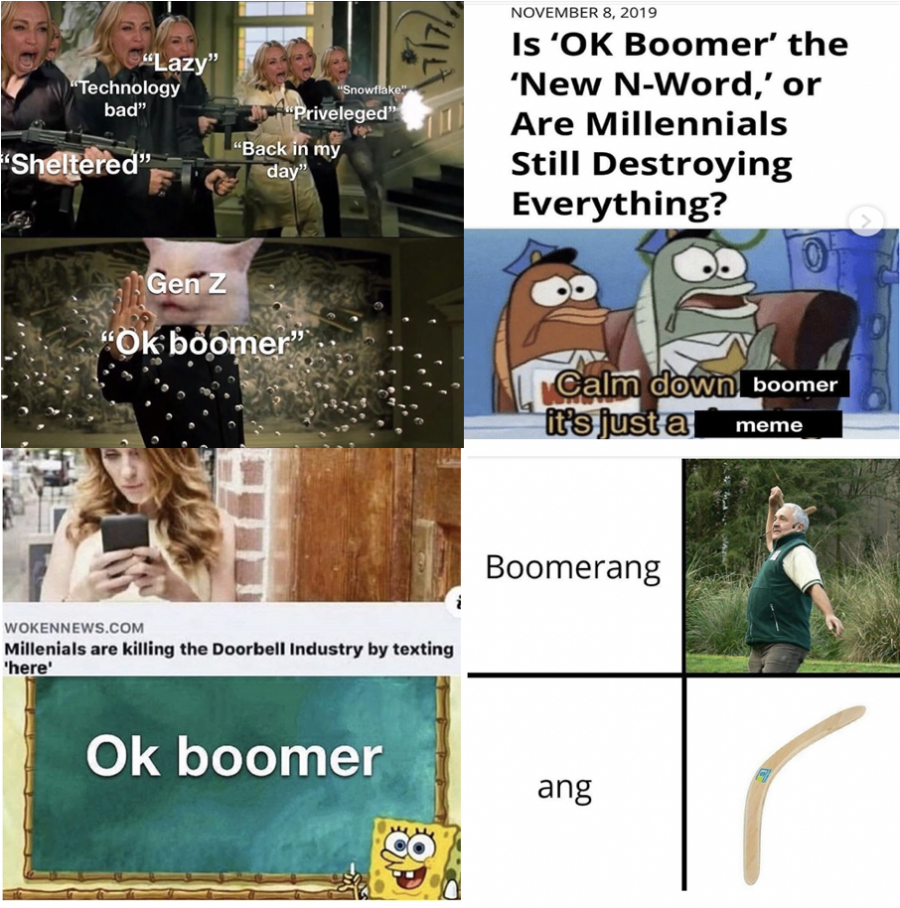
Various memes about 'ok boomer' posted on Instagram
All of this is very frustrating to some boomers. People from the Baby Boomer generation feel attacked by all of this, and call the term an ageist slur. Bob Lonsberry, an American radio talk show host and boomer, tweeted that ‘boomer’ is 'the n-word of ageism' in a tweet that he later deleted. Some boomers complained about co-workers using ‘ok boomer’, and some employers even e-mailed employees with regard to this to make clear that use of the term would not be tolerated. Rachel Premack, for instance, a transportation reporter, got an e-mail saying ‘many do not appreciate the potential ageist interpretation of the term’ and that ''ok boomer’ is not OK in the workplace’. Boomers even introduced the term 'ok zoomer' as a defence.
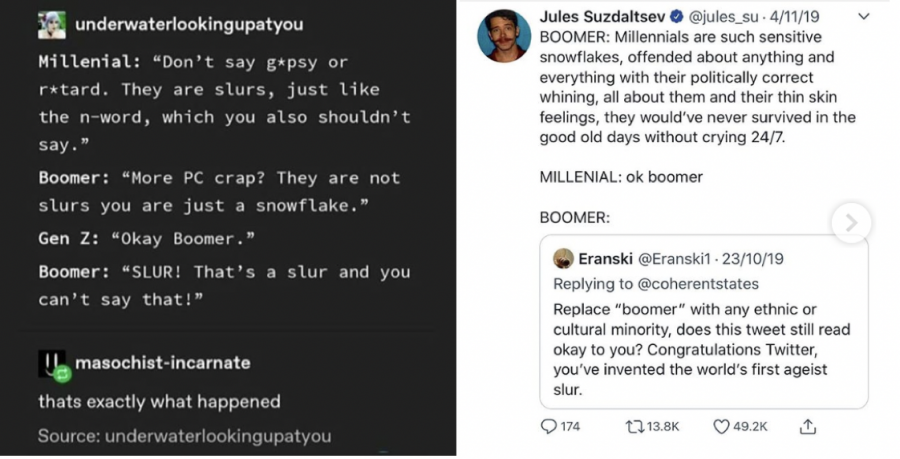
Ironic memes about boomers suddenly being sensitive.
The response of the boomers
Many boomers feel that milenials and generation Z are being too harsh on them. Others say that the term is straight-up offensive, and they should have respect for elderly people.
Other groups of 'too sensitive boomers, have decided to try to turn the roles over with: "OK zoomer"'. According to Urban Dictionary:
'The term Zoomer is also in reference to the fast-paced upbringings members of generation Z are characterized to have due to the fast advances in technology and culture that has been happening around them as a result of the interconnectivity of the American and Global populations because of the ubiquity of internet-connected smart phones and social media.
[Example:] I can't stand those Zoomers, all they do is use their phones all day to play Fortnite and watch TikTok videos!'
Are millennials next?
The current trend as described in this article, is not only one of generation Z’s making. There is a big overlap with millennials also using 'ok boomer', and thus participating in the creation of memes. However, there are already memes being created about the inevitability that millennials (generation Y) will be the next targets. The question remains as to whether this is accurate at all. Not only because of the issue of the sustainability of these memes, but also because of the changing social landscape. Over time, the weight of the 'ok boomer' meme is already slipping. Like with most memes, it moves into a limbo state of it either having a resurgence or being overused and slowly dying. This resurgence can be aimed at a new target, or simply be a reinvention of the meme—which could very well be about millennials.
Right now, the younger generations are dismissing the older generation, but when these now young generations age, the same will happen to them.
However, it should be noted that there is a big generational gap between baby boomers and generation Y/Z. This gap is less significant and less apparent between millennials and zoomers. For instance, generation Y is largely a generation of tolerance, which continues to be true for generation Z. They also face the same troubles as previous generations. Still, some signs of disdain towards millennials jumping on the bandwagon and even claiming ‘ok boomer’ as their own, might actually point towards millennials being next.
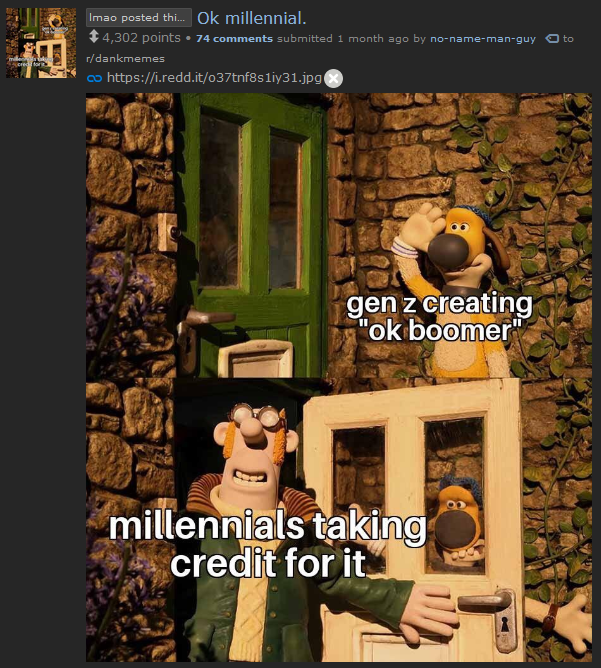
Generation Z turning on Millennials for claiming ok boomer
Some memes go even further and are starting to go after millennials. However, the amount of upvotes and trending threads of this kind, is not nearly as big as that of boomer memes. Also, the effects of the memes aren’t on the same level. The same goes for the uptake of millennial-targeting memes, or 'ok moomer' memes, or whatever the eventual meme might be. The reason for this is that millennials are still the most highly represented group on platforms like Reddit, on subreddit /r/dankmemes in particular, and also on 4chan. Certain sub-forums do see an increasing amount of generation Z users, so the possibility of them taking over and the threads against millennials becoming more popular will become more realistic.
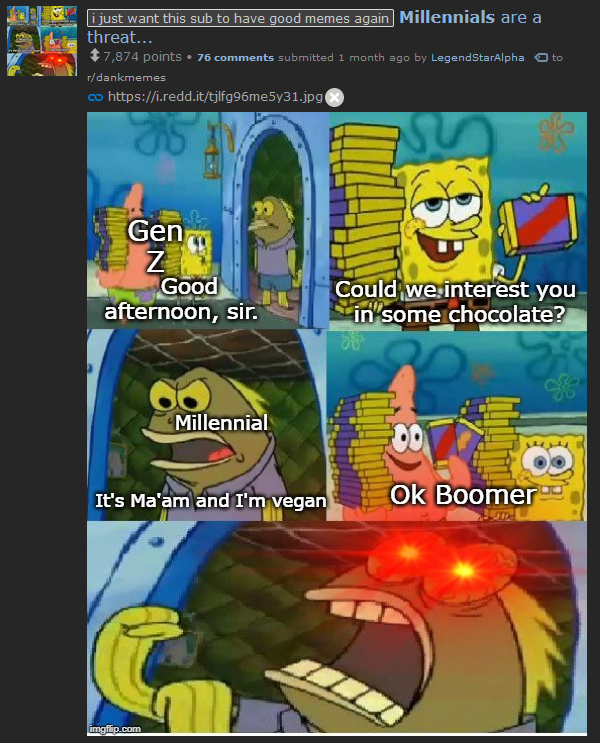
Memes shifting slightly towards Millennials being targeted.
It is also often hard to tell whether boomers are making anti-millenial threads, like the one below, or if it's actually zoomers that are opening the offensive. However, the thread below strongly implies that it is in fact a boomer trying to save face, and is thus greeted with a certain comment in the comment sections. That comment of course is 'ok boomer'. Threads like these imply that if such an aggressive shift comes towards millennials it will have to come from a younger generation since the boomers will just be greeted with the same reaction again and again by both generation Y and Z.
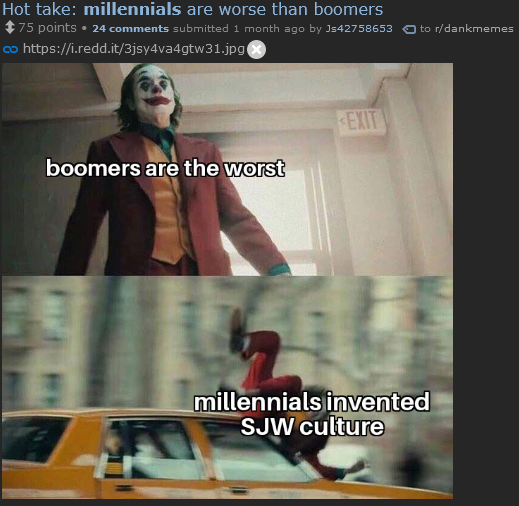
Boomers trying to shift the focus on Millennials blaming them for SJW culture.
To what effect?
The sheer fact of how widespread this meme has become shows that it affects people on both sides. The posters feel like it is a way to express their issues with the baby boomers and tell them they are fed up with them. But there is, of course, another group that is being affected by this trend and that is the target itself.
Besides the aforementioned general frustration among boomers, the 'ok boomer' phenomenon created some interesting responses from the self-proclaimed 'victim group' in mainstream media. For some columnists, it has actually sparked outrage or confusion beyond borders to the point of seeing articles about it in Dutch newspapers.
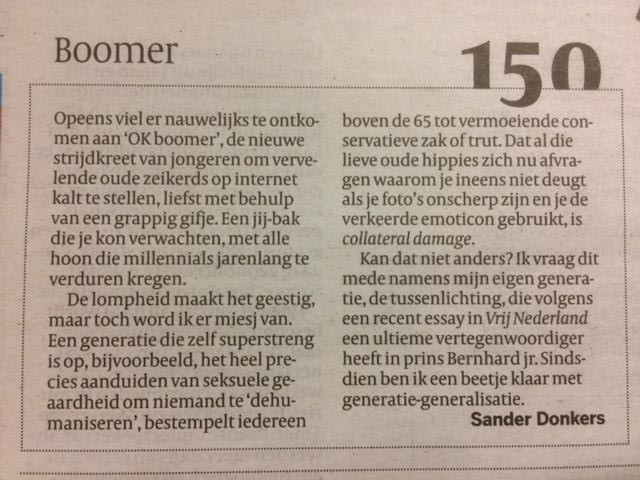
Column in Dutch newspaper questioning the rise and usage of ok boomer.
Sander Donkers wonders why a generation that is 'extremely strict' about tolerance (for example, not discriminating on the grounds of sexuality), can be so quick to label anyone above 65 as a conservative jackass. Especially when a part of that generation, according to Mr. Donkers, are just sweet old hippies wondering what they did wrong? His column voices a concern heard a lot from boomers, namely wondering if it couldn’t be done any other way. A more tolerant way, perhaps? However, this brings us backback to the origins of it all. The fact that apparently the 'other way' didn’t work. Generation Z and Millennials created this meme because felt that they weren't being heard and respected.
The controversy has even come as far as Forbes publishing articles for boomers that teach them 'how to respond to Gen Z’s new meme'. They do, however, take an intersting position on this. Mark. C. Pena argues that outrage is not the way. Instead, boomers should listen, show respect, and converse with the other party to get their point across and see if there is any common ground or understanding to be found.
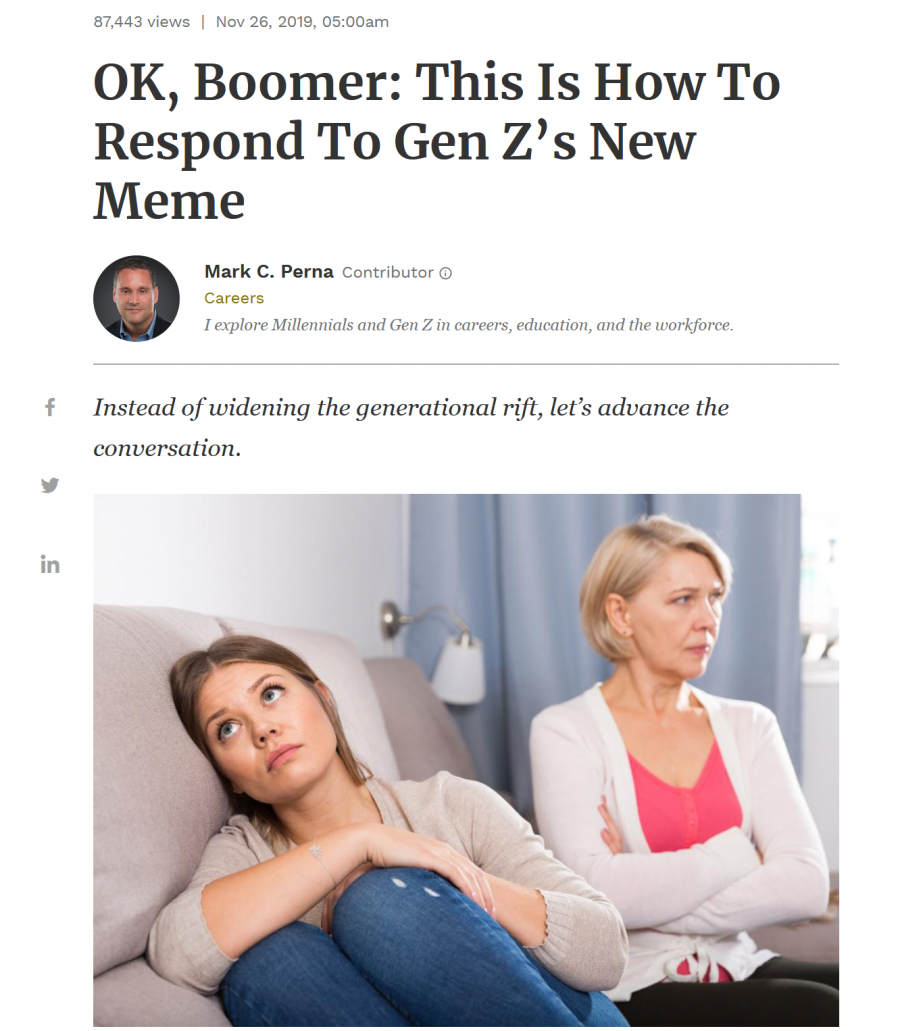
Mark C. Pena about OK, Boomer and how to respond on forbes.com
Something that is really interesting and noteworthy about his response is that he talks about what brought the meme into existence. That is, the worries felt by younger generations and the pressure they feel, which makes them be critical of past generations as well as the future. This is the way to eventually work together and grow as a species, and not be completely locked in and blind to what we can learn from one another.
Ok boomer as a phenomenon
The 'ok boomer' phenomenon tells us that the current generations use memes as a way to express themselves and as a vehicle for activism. In this case, the boomer meme is a gross generalization or a form of stereotyping the boomer generation with the intent to 'fight back'. The reason for the meme's creation originates in feeling unheard and unfairly judged. The producers of the memes, generations Y and Z, feel that this is one of their last resorts when countering the Baby Boomer generation. The platforms they primarily use and dominate in presence are the best mediators for their content. Since they are amongst peers on these platforms, sharing, the 'ok boomer' meme has a bigger chance of resonating with the audience, and thus being spread and surviving. The memes are also starting to be created purely to satisfy their peers with content they can relate to, whilst shining a spotlight on boomers. Thus, producers and consumers of the memes come from the same group of people. It is also interesting that the subject, boomers, is less represented on the platforms, and so a counter-movement is hard to facilitate. They can’t compete because of the sheer numbers of generation Y/Z people out there on these platforms.
As the popularity of the 'ok boomer' meme grows, it almost transforms memeing into a political practice, where the large reach and the fast and easy spreading of content can create new discourses in the generation war.
References
Spector, Nicole (November 6, 2019) ‘'OK boomer' is dividing generations. What does it mean?’ NBC News.
Burghout, W. (2019, August 24). Generatie Y in beeld: de kenmerken van de Millennials. Generation Journey.
Collett, Michael (November 7, 2019) ‘How the phrase ‘OK boomer’ suddenly went all over the internet’ ABC News.
Lorenz, Taylor (November 20, 2019) ‘’OK boomer’ Marks the End of Friendly Generational Relations’ The New York Times
Perna, M. (2019, November 27). OK, Boomer: This Is How To Respond To Gen Z’s New Meme. Forbes.
Premack, Rachel (November 8, 2019) ‘inbox’ Twitter.
https://knowyourmeme.com/memes/ok-boomer
Graham, J. (November 15, 2019). 'The origins of the 'Ok boomer' meme explained' Vogue.
Leigh, K. (November 9, 2019) 'If you're mad about 'ok boomer', you're probably part of the problem' Medium.
Unknown. (October 30, 2018) 'Urban dictionary’: zoomer'

